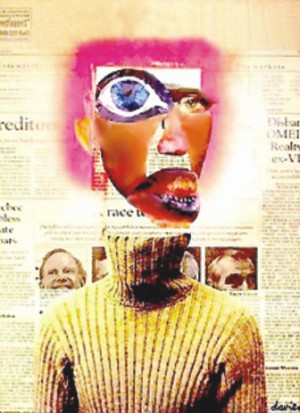|
Opinion
Reflecting on the Generation
Shamsher Chowdhury
The term Generation Gap is too often used these days. In the Bangladesh context this phenomenon emerged more prominently particularly during the past two decades or so. The younger generation, often use this as a tool to justify their viewpoints or " justify" a mode of behaviour or an action. It looks as though this catchy phrase is also used and abused to shun and keep the so-called generation of yesterday and the day before, at bay. The younger generation often uses the term, as a shield to hide its unruly conduct of intolerance, indiscipline and indulgence in all its dimensions. Here in Bangladesh the younger generation does have a serious conceptual gap in understanding the meaning and essence of the terminology. Many young people of today also tend to use and hide behind this as an excuse for their failures to empathise and sympathise with the older generation. Although part of this is inevitable with social, economic and scientific changes and development around the world, it must be said that this business of the Generation Gap has been carried too far.
 I am in my early sixties and a large segment of the siblings of my brothers and sisters and their children who I call the second and the third generations are abroad. On the other hand many live in this Metropolitan city and continue to be carried away by the charms of Bashundhara complex and a variety of shopping complexes, offering all kinds of merchandise which most of us could do without. The ones abroad are pursuing higher studies. There are others who are both working and studying while a few of them have taken up employment and are residing permanently with their wives and children. Many of them come home to Bangladesh once every year or so. There are those who do not visit their homes in Bangladesh even in years. I am talking about children and grandchildren of comparatively well-to-do section of our population. The generation gap I am referring to is mostly between these categories of young men and women and us, the senior citizens, fathers and grand fathers. I am in my early sixties and a large segment of the siblings of my brothers and sisters and their children who I call the second and the third generations are abroad. On the other hand many live in this Metropolitan city and continue to be carried away by the charms of Bashundhara complex and a variety of shopping complexes, offering all kinds of merchandise which most of us could do without. The ones abroad are pursuing higher studies. There are others who are both working and studying while a few of them have taken up employment and are residing permanently with their wives and children. Many of them come home to Bangladesh once every year or so. There are those who do not visit their homes in Bangladesh even in years. I am talking about children and grandchildren of comparatively well-to-do section of our population. The generation gap I am referring to is mostly between these categories of young men and women and us, the senior citizens, fathers and grand fathers.
Many of these young men and women view "us" as old fashioned and often objects of pity. They seem rather annoyed if you talk of being frugal and austere in one's lifestyle. Try talking to them about the golden rule of "early to bed and early to rise..." they think you are out of tune with the latest "trend" in modern day lifestyle. Ask them as parents or uncles to come, join you over a dinner or a family gathering they would most likely say that they prefer eating out with friends. As far as they are concerned, kindness, tolerance and compassion towards the older generation are matters of expediency.
The so-called Generation Gap is further widened by the extraordinary development of the information technology. Contrary to popular belief (it is my impression) that this development of the high-tech of the 21st century has torn apart the "human element" from the generation of today and has farther widened the gap. The communication between our generation and the younger ones is often restricted to dry, lifeless and hardcore essentials of life and living. On the other hand this IT technology (emails, voice mails, digital photography and God alone knows what else) has also contributed to further widening the Generation Gap in as far as the finer elements of intense human interaction are concerned.
The Generation Gap here in Bangladesh has yet other dimensions. Only the other day I tried to question the relevance of the Valentine's Day in our cultural heritage much to annoyance of several young men and women present. Since when did, Bangladeshis needed a Valentine's Day to express their faith and commitment to Love? In what way is Valentine's Day a part of our cultural heritage? The same goes for Father's Day and Mother's Day. The problem with such social and cultural practices is that a time will come, when love of a mother for a son or a daughter or vice versa will be confined only in the pages of a greeting card. So also, in the case between a father and a son or a daughter.
I do not own a mobile phone, an instrument which has become yet another factor in the Generation Gap here in Bangladesh. I certainly do not begrudge the owners of mobile phones but with more than most of the people these are a symbol of "status". If you do not own a mobile telephone these days you are certainly "old fashioned". Just consider this: I have made an appointment to meet someone at some place at an appointed time on an appointed date through mutual consent only 24 hours before and yet I receive as many as three, four or even a greater number calls from my young friend giving a " detail description of the progress of his journey en-route leading to the venue of the meeting as proceeds for the venue." Needless to say that mobile phones have other high utility values.
 What makes this business of Generation Gap in Bangladesh particularly alarming is that it is based on false and a poor understanding of the issues that create the " Gap". Most of our younger generation is lost and carried away by the outer frames of the various technological and other social developments globally. They are unable to understand and appreciate the deeper elements of humanity and human development, instead being completely overtaken by the aroma of the western values of " freedom". Meaningful progress and development cannot be achieved without a profound respect for one's own traditional values. Ideally the gap can only be narrowed down by bringing about a combination of the "values " of the modern day world and the traditional classical values typical of a particular nation. In this regard we may turn to our neighbour India who has most successfully achieved that classical blend and thus has a very healthy "Generation Gap". What makes this business of Generation Gap in Bangladesh particularly alarming is that it is based on false and a poor understanding of the issues that create the " Gap". Most of our younger generation is lost and carried away by the outer frames of the various technological and other social developments globally. They are unable to understand and appreciate the deeper elements of humanity and human development, instead being completely overtaken by the aroma of the western values of " freedom". Meaningful progress and development cannot be achieved without a profound respect for one's own traditional values. Ideally the gap can only be narrowed down by bringing about a combination of the "values " of the modern day world and the traditional classical values typical of a particular nation. In this regard we may turn to our neighbour India who has most successfully achieved that classical blend and thus has a very healthy "Generation Gap".
Here in Bangladesh, the failure for creating a healthy balance in the "gap" however lies equally on the shoulders of both the older and the younger generations alike. Both parties must approach the issues at stake with compassion and open minds. While the older generation must spend more time with their wards and children, the two must be prepared to listen to each other's points of view. For the older generation one of the key issues to pursue and prevail upon with the younger generation would be to all out efforts to strike a rational balance between this mad race for excessive material affluence and the high value of our traditions and culture.
Copyright
(R) thedailystar.net 2005 |
